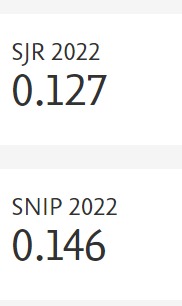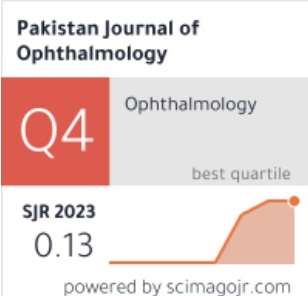Comparison of Peribulbar and Topical Anesthesia in Phacoemulsification Cataract Surgery in Terms of Pain
Doi: 10.36351/pjo.v40i4.1855
DOI:
https://doi.org/10.36351/pjo.v40i4.1855Abstract
Purpose: To compare effectiveness of Peribulbar and topical anesthesia in phacoemulsification in terms of severity of pain.
Study Design: Quasi experimental study.
Place and Duration of Study: This cross sectional study was conducted at Eye Department, Liaquat National Hospital, Karachi, from August 2017 to January 2020.
Methods: This study included 1154 patients of 40-75 years of age who underwent phacoemulsification. Complete ocular examination was performed. Patients were allocated into two groups by convenient sampling. Cataract surgery was performed under Peribulbar anesthesia in 577 patients and other 577 patients were operated using topical anesthesia. Pain was assessed by Visual Analogue Scale Score. Frequency and percentage and mean± standard deviation was computed for qualitative and quantitative variables respectively using SPSS version 21. Chi square test was used for stratification of gender, duration of symptom and age, p≤0.05 was considered significant.
Results: Average age of the patients was 57.43±6.70 years. There were 576(49.9%) males and 578(50.1%) females. There were 34 (5.9%) patients in Peribulbar group and 382 (66.2%) patients in topical group who had no pain (p=0.0005).Frequency of mild, moderate and sever pain was less in patients given topical anesthesia. The rate of pain was significantly higher in older and female patients with shorter duration of symptoms (p 0.0005).
Conclusion: Phacoemulsification can be accomplished efficiently and effectively using topical anesthesia. Compared to retro bulbar and Peribulbar anesthesia, it offers several advantages and a high degree of pain satisfaction for the patient.

Downloads
Published
How to Cite
Issue
Section
License
Copyright (c) 2024 Fatima Ahmed Ahmed, Abdul Hameed Siddiqui, Imran Ghayoor

This work is licensed under a Creative Commons Attribution-NonCommercial 4.0 International License.






